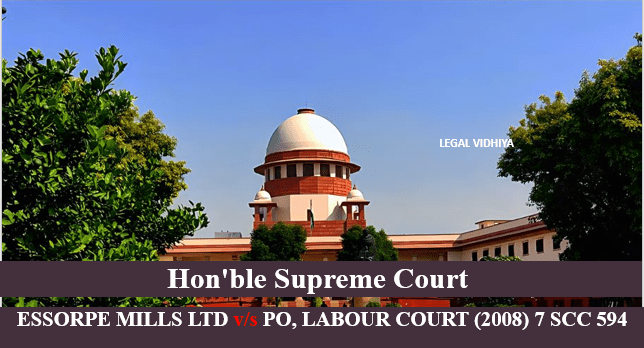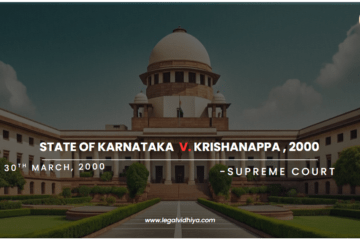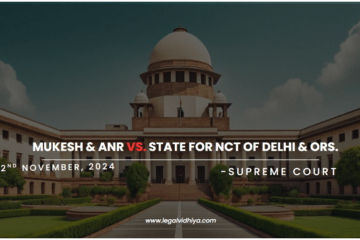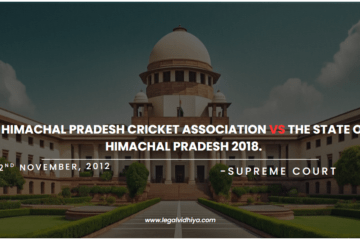
| Citation | (2008)7 SCC 594 |
| Date of Judgment | 04 April2008 |
| Court | Supreme Court of India |
| Case Type | Civil Appeal |
| Appellant | Essorpe Mills Ltd |
| Respondent | Presiding Officer, Labour Court |
| Bench | Dr. ARIJIT PASAYAT & P. SATHASIVAM |
| Referred Sections | Section 33, Section 22 |
FACTS OF THE CASE
In the case of Essorpe Mills Ltd vs. Presiding Officer, Labour Court and Ors, the central issue revolved around the legality of a strike conducted by textile mill workers and the subsequent disciplinary actions taken by the management. Respondents 2 to 23 initiated an unauthorized strike in November 1990, leading to the suspension of all 55 participating workers. While some workers apologized and were reinstated, others persisted in their strike.
In response, the Tamil Nadu Panchalai Workers’ Union served a strike notice in March 1991. The management subsequently dismissed respondents 2 to 23 for their participation in the strike. The workers filed petitions for reinstatement with back wages and continuity of service.
The Labor Court found the strike to be illegal but, under Section 11-A of the Industrial Disputes Act, 1947, substituted the punishment of dismissal with discharge and awarded compensation to each worker. The High Court, however, upheld the workers’ plea for reinstatement with full back wages and continuity of service, citing non-compliance with Section 33(2)(b) of the Act.
The Supreme Court, in its judgment dated April 4, 2008, ruled in favor of the management. It held that the strike notice did not comply with the Act’s requirements, as it did not provide the mandated six-week notice. Consequently, there were no valid conciliation proceedings pending at the time of the workers’ dismissal. The Court set aside the previous judgments and gave the workers the option to comply with certain terms outlined in an earlier court order.
ISSUES
The main issues in the case were:
- Validity of Strike Notice: The primary issue centered around whether the strike notice issued by the workers complied with the legal requirements of the Industrial Disputes Act, particularly the mandated six-week notice period.
- Applicability of Section 33: Another key issue was whether Section 33, which requires the permission of the Conciliation Officer for the dismissal of workers during conciliation proceedings, was applicable given the circumstances surrounding the strike notice and subsequent dismissals.
ARGUMENTS
- Appellant’s Position: The management, Essorpe Mills Ltd, contended that the strike notice issued by the workers did not meet the legal requirements of the Industrial Disputes Act. They argued that the notice lacked the mandated six-week advance notice, rendering it invalid. Consequently, they maintained that no conciliation proceedings were pending at the time of the workers’ dismissal, making Section 33 inapplicable.
- Respondent’s Position: Respondents 2 to 23, the striking workers, argued that once a strike notice is issued under Section 22 of the Act, conciliation proceedings are deemed to have commenced, citing the Lokmat Newspapers Pvt. Ltd. vs. Shankarprasad case. They contended that the strike notice was valid and that Section 33 applied, requiring the permission of the Conciliation Officer for their dismissal.
JUDGEMENT
In the judgment rendered on April 4, 2008, by the Supreme Court of India in the case of Management, Essorpe Mills Ltd vs. Presiding Officer, Labour Court and Ors, the Court ruled in favor of the management, Essorpe Mills Ltd.
The key points of the judgment:
The Court held that the strike notice issued by the workers did not conform to the legal requirements of the Industrial Disputes Act. Notably, the notice did not provide the mandated six-week advance notice, rendering it invalid. As a result, there were no valid conciliation proceedings pending at the time of the workers’ dismissal.
The Court rejected the argument that Section 33, which requires the permission of the Conciliation Officer for the dismissal of workers during conciliation proceedings, was applicable. It emphasized that the notice was a crucial prerequisite for initiating conciliation proceedings, and since it was flawed, Section 33 did not come into play.
REFERENCES
This Article is written by Sakshi Pawar of ISB&M College of Engineering, Pune, Intern at Legal Vidhiya.




0 Comments